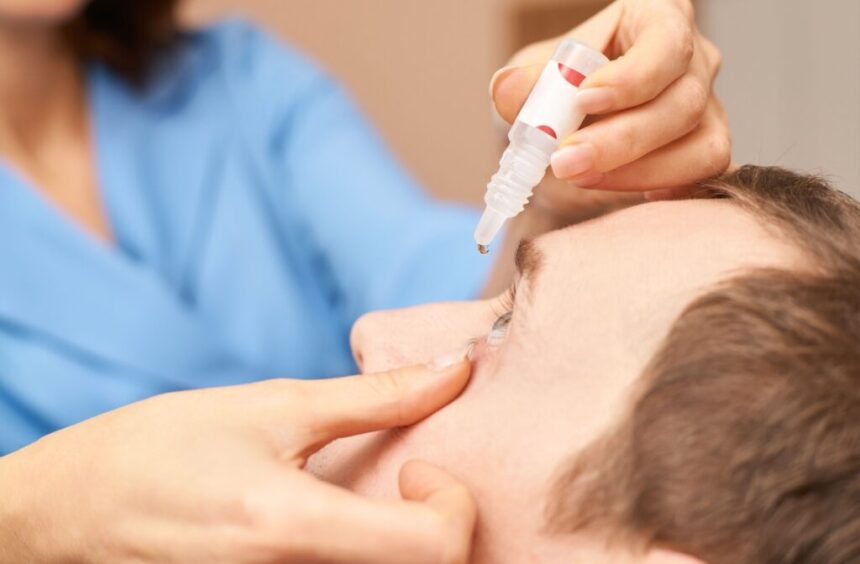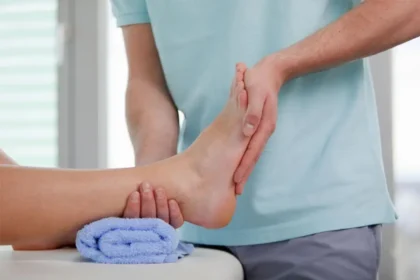An optometrist is a healthcare professional who specializes in examining, diagnosing, and treating conditions affecting the eyes. They provide comprehensive eye care services, including prescribing corrective lenses and managing various eye conditions. Here is information on dry eye treatments with a specialist:
Diagnosis
The diagnostic process for dry eyes begins with a comprehensive eye examination. Your optometrist will review your medical history and discuss symptoms you’re experiencing. They’ll ask about factors that may contribute to dry eyes, including medications, environmental conditions, and lifestyle habits. Some common symptoms of dry eye disease are:
- Burning
- Stinging
- Grittiness
- Leaking Mucus
- Watering Eyes
During the examination, your doctor will measure tear production using the Schirmer test. This diagnostic test involves placing small paper strips under your lower eyelids to assess tear volume over a specific time period. Your doctor may also perform tear breakup time testing, where dye is applied to evaluate how quickly tears evaporate from the eye’s surface.
Treatment
Treatment approaches vary based on the underlying cause and severity of your dry eye condition. There are three types of dry eye disease:
- Aqueous Tear-Deficient Dry Eye: This occurs when the lacrimal glands fail to produce enough tears to maintain adequate eye lubrication.
- Evaporative Dry Eye: This type is often caused by meibomian gland dysfunction (MGD), where the glands located at the edge of the eyelids do not secrete enough oil to stabilize the tear film. The lack of oil leads to the faster evaporation of tears, contributing to discomfort, inflammation, and irritation.
- Mixed Dry Eye: Many individuals experience a combination of both aqueous tear deficiency and evaporative dry eye. A multifactorial condition, mixed dry eye requires a comprehensive approach for diagnosis and treatment, addressing both inadequate tear production and excessive tear evaporation.
Your doctor may recommend artificial tears as an initial treatment, selecting formulations for frequent use. For patients with MGD, your optometrist may suggest using warm compresses and maintaining a proper eyelid hygiene routine to improve oil gland function. Punctal plugs offer a physical solution for tear drainage issues. By inserting these small devices into your tear ducts to slow tear drainage, punctal plugs keep natural tears on your eye’s surface longer. These plugs come in temporary or permanent options, allowing for customized approaches.
Long-term Care
Managing dry eyes often requires ongoing care and monitoring. Your optometrist will schedule regular follow-up appointments to assess the effectiveness of your treatment and make any necessary adjustments to your care plan. They’ll track changes in tear production, evaluate symptom improvement, and monitor for potential complications.
Environmental modifications and lifestyle changes form an integral part of treatment plans. Your optometrist will provide guidance on improving indoor air quality, adjusting computer usage habits, and protecting eyes from wind and dry conditions. Seasonal adjustments may be necessary, as dry eye symptoms often fluctuate with weather changes.
Long-term management frequently involves combination therapies. Your provider may recommend continuing certain treatments while gradually introducing new approaches, based on your response and changing needs. They’ll also monitor for underlying conditions that might develop or worsen over time. Your optometrist will teach you to recognize early signs of flare-ups and provide strategies for maintaining eye comfort between appointments.
Schedule an Optometrist Appointment
If you experience persistent dry eye symptoms, an optometrist provides access to a comprehensive evaluation and targeted treatment options. Early intervention often leads to better outcomes and can prevent complications associated with untreated dry eye disease. Contact a specialist today.









